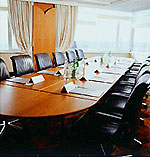World Bank Praises ‘Doing Business’ Progress

(Moscow Times – themoscowtimes.com – Irina Filatova – January 18, 2013)
Russia is on the right path to radically improve its business environment and move up 100 notches within the next five years in the global rankings of the favorableness of countries’ investment climate, a World Bank official said Thursday.
But its eventual position in relation to other countries in the Doing Business rankings is less important than the actual progress it is making to become more friendly to investors.
President Vladimir Putin’s goal to make Russia 20th out of 185 economies by 2018 is very ambitious, but the government’s commitment to improve regulation and the creation of a medium-term plan to bring those efforts to life is a good foundation for improving the rating, said Augusto Lopez-Claros, the bank’s director of global indicators and analysis.
“And whether it comes to the 20th or 25th place by 2018 is a less important issue than the direction of changes,” he said at a panel session at the Gaidar Forum.
Lopez-Claros, who oversees the compilation of the Doing Business rankings, praised recent efforts by the government to improve the investment climate and said further progress will require a consistent policy and strong political will.
However, he remained cautious about predicting whether Russia will make it to 20th place over the next six years.
“Clearly there’s room for growth,” Lopez-Claros said.
If Russia achieves the goal, it will become a rare example of a country making such rapid progress in moving up in the rankings in a short time.
The only country to make such a leap is Georgia, which skyrocketed from No. 100 in 2006 to No. 9 in 2013 as a result of drastic changes to the law enforcement system, said Kirill Rogov, a senior fellow at the Yegor Gaidar Economic Policy Institute.
The World Bank ranked Russia No. 112 in this year’s list, up from 120 in 2012.
Moving up eight places during a one-year period “is not a breakthrough, but it indicated that we’re moving in the right direction,” said Deputy Economic Development Minister Sergei Belyakov, who participated in the panel.
To fulfill Putin’s order, the ministry must ensure a rise of 31 places this year so that Russia will be ranked 81st in next year’s Doing Business report, according to a decree signed in November by Prime Minister Dmitry Medvedev.
Some economists expressed doubt that this short-term goal is achievable.
“The legislative field for 2013 is already outlined. Unfortunately, no laws aimed at improving the business climate were passed in 2012,” Russian Economic School rector Sergei Guriyev and Yale University professor Oleg Tsyvinsky said in an article published Wednesday in Vedomosti.
The article ironically said the State Duma was busy with “other important things,” like Internet regulation and the “foreign agents” law.
However, the article stated, meeting the 2018 deadline is “absolutely realistic” if the authorities turn their words into deeds in 2013. Approving the privatization plan for 2014-16 is a key measure, the article said. The government missed the Nov. 1 deadline to provide the plan.
The government is counting on a number of measures to facilitate further progress. The plan for this year involves creation of an investment map of Russia to help companies learn about the investment potential of different regions, Andrei Nikitin, director of the Agency for Strategic Initiatives, said at an earlier panel.
Another step is implementing what the government calls road maps, detailed tactical plans created in concert with businesspeople to measurably speed up state-provided services to businesses and reduce bureaucratic barriers.
The third measure to improve the business climate is encouraging startups so that more young people will chose entrepreneurship as their life path, said Nikitin, whose agency oversees the promotion of business activity in the country.
Belyakov said his ministry sees 20th place in the World Bank’s rankings as a realistic goal.
“Based on that goal we were planning our activities,” he said.
